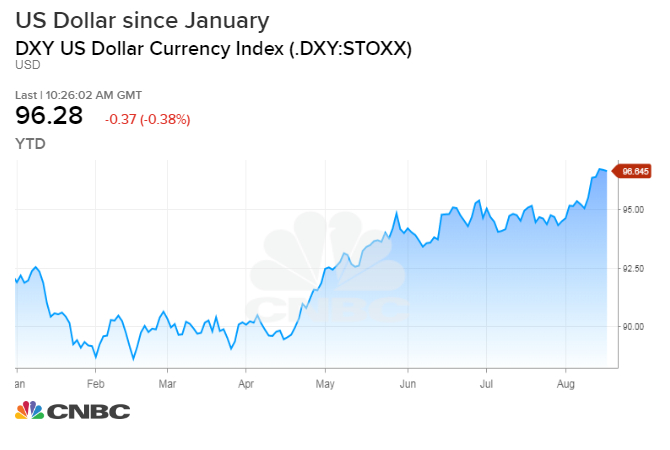The U.S. stock market is well on its way to better-than-average gains this year, but a quick glance at overseas markets reveals a more sobering story.
Global stock markets are having a tough 2018.
While the S&P 500 is up more than 6 percent and less than 1 percent away from new highs, the iShares MSCI China exchange-traded fund is down more than 12 percent so far this year. The iShares China ETF — like others managed by financial giant BlackRock — tracks the results of an index of country-specific stocks.
Although some have speculated that fears of slower economic growth in China may be partly responsible for feeble stock performance there, Hong Kong and Shanghai are by no means alone.
“I think one of the biggest stories throughout the year has been the pressure we’ve seen on emerging markets,” said Scott Brown, chief economist at Raymond James. “A lot of these countries have high levels of debt, so higher rates put pressure there.”
Ever since the Federal Reserve began unwinding its massive balance sheet and hiking interest rates, the U.S. dollar has gradually climbed against a basket of other currencies. All else equal, higher interest rates in a country increase the value of that country’s currency as foreigners flock to take advantage of better yields.
A weak dollar tends to juice emerging markets as debt denominated in U.S. dollars becomes easier to repay with local-currency revenue. A stronger greenback, on the other hand, can drive investors back to the dollar.
The U.S. dollar fell 0.3 percent against a basket of currencies to 96.32 on Friday but remains 8 percent higher in the last six months.
The downturn in emerging market equities represents an about-face for Wall Street, which spent much of 2017 pouring cash into emerging-market ETFs.
In the 12 months preceding the S&P 500’s all-time high clinched earlier this year, investors dumped more than $6 billion in net flows into the iShares MSCI Emerging Markets fund. The ETF added more than $2.3 billion in the month preceding the sell-off.
That same ETF dipped into a bear market on Wednesday after falling more than 20 percent from its January high, with investors pulling out more than $7.2 billion since Jan. 26.
Credit fears spiked again this week, and Turkey’s financial crisis sent its currency plummeting 14 percent on Friday.
“If your liabilities are in dollars but assets/cash flow sources are in local currency, relative strength in the dollar can spell trouble,” Katie Nixon, chief investment officer at Northern Trust, said in an emailed statement on Monday. “There are certain emerging market countries with relatively weak currencies and a heavy reliance on external [predominantly dollar-based] financing. The fear is that what happens in Turkey won’t stay in Turkey.”
Developed market exchange-traded funds tracking British, German and French equities are down 6.9 percent, 11.6 percent and 3.9 percent, respectively, since January. While Raymond James’ Scott Brown added that investors aren’t as concerned with Europe’s credit just yet, aggressive trade policies from Washington aren’t helping.
“Trade policy is a negative and people look at the direct impacts on tariffs, but they also create general uncertainty,” he explained. “You don’t know what the policy will be a year from now, so businesses are more cautious. Tariffs tend to be paralyzing in terms of global investment.”
Trump has repeatedly agitated relations with trading partners in Europe and Asia in the hopes of reducing billion-dollar trade deficits. He has threatened and imposed tariffs on a host of Eurozone and Chinese goods.
Tweet trump
Earlier this year, the president introduced tariffs of 25 percent and 10 percent on imports of steel and aluminum, respectively, from most countries. The move drew ire from China, the European Union, Mexico and Canada, which put tariffs on U.S. products.
The Chinese Ministry of Commerce announced earlier this month a 25 percent charge on $16 billion worth of U.S. goods, including large passenger vehicles, motorcycles and asphalt. The EU put its own tariffs on $3.3 billion of U.S. goods in response to the steel and aluminum tariffs. The Europeans are taking aim at American bourbon whiskey and Harley-Davidson motorcycles, among other products.
The U.S. and EU have since agreed to begin “dialogue to reduce differences on regulatory standards between the two economies” following European Commission President Jean-Claude Juncker’s trip to Washington in late July.
The U.S. Department of Commerce reported earlier this month that the U.S. trade deficit increased 7.4 percent in June despite the president’s efforts.


 Signal2forex.com - Best Forex robots and signals
Signal2forex.com - Best Forex robots and signals




